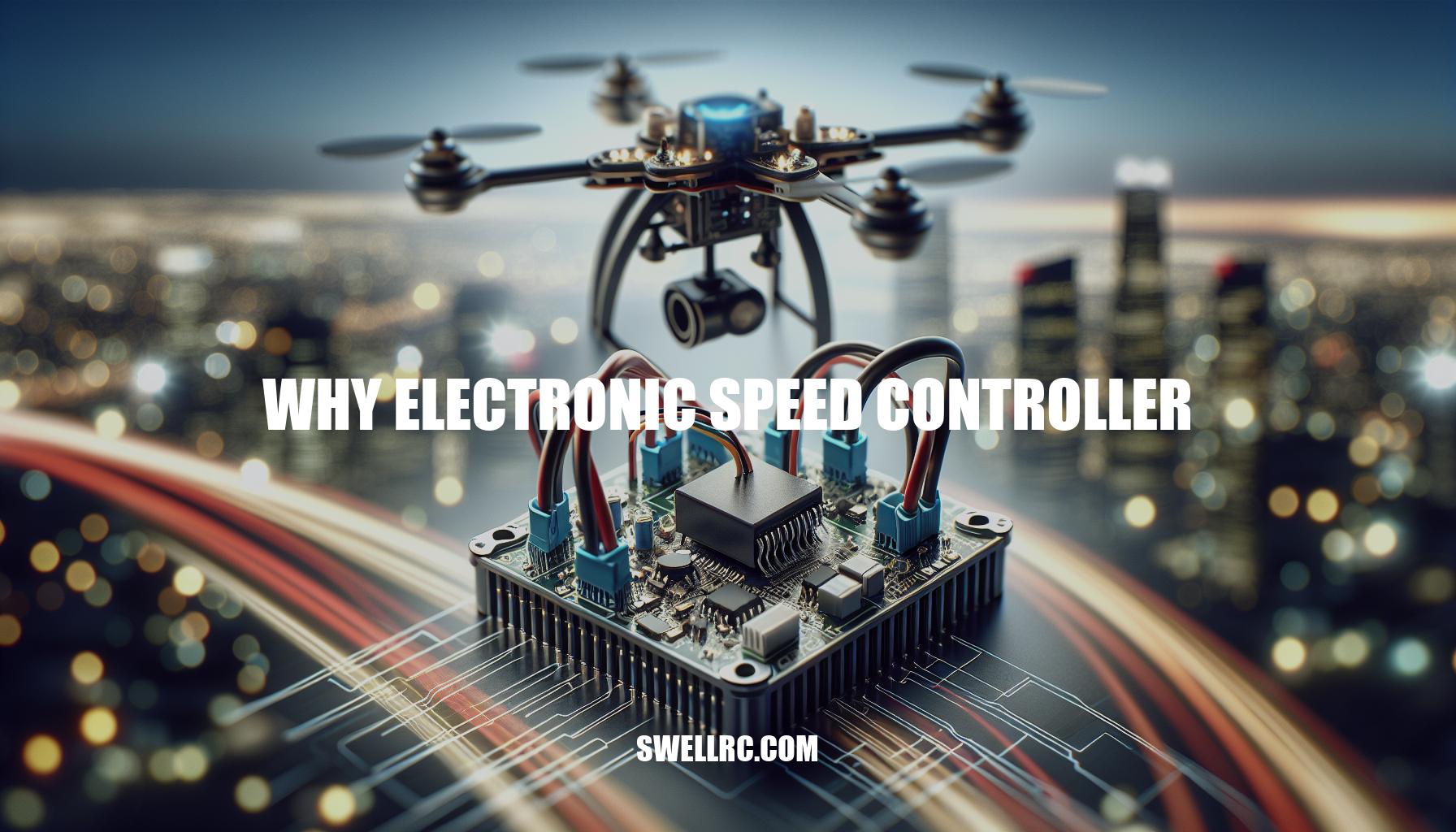Why Electronic Speed Controller: Understanding the Importance and Evolution
Picture this: you’re driving a sleek, powerful car but there’s no gearbox. Madness, right? You couldn’t control your speed, let alone change direction or brake. Well, that’s where an Electronic Speed Controller (ESC) comes into play in the world of motor vehicles and aircraft models. Think of it as the unsung hero, the invisible gearbox that makes your electrically powered motor vehicles, drones, and model aircrafts tick. An essential component pulling the strings behind the scenes, an ESC expertly converts all that glorious DC power from your battery into AC power, controlling the speed, direction, and braking power of your motors. Without it, your powerful motor is like a wild horse with no reins. Pretty important, eh? That’s the magic of the Electronic Speed Controller.
The Evolution and Advantages of ESCs
Though prevalent today, electronic speed controllers (ESCs) were not always part of our everyday technology. Turning back the clock to the 1990s, we find that mechanical speed controllers were the norm. However, they faced extinction as their electronic counterparts gained favor due to their superior efficiency, the addition of dynamic brake features, and unprecedented reliability. Why electronic speed controller? The answer lies in its evolution which faithfully reflects the leaps and strides of innovation made in this domain. According to industry reports, the global ESC market size was valued at an impressive USD 8.28 billion in 2019. But the accelerator doesn’t stop there. Forecast data predicts the ride to continue at a compound annual growth rate (CAGR) of 4.0% from 2020 to 2027 – providing a clear indication of the growing reliance and trust we have on this technology. ESCs have truly taken the driver’s seat in powering our electrically driven world – from drones to model aircrafts, and electric vehicles – defining our human progress in a significant way. Stay with us, as we shift gears to understand the unique technology behind ESCs.
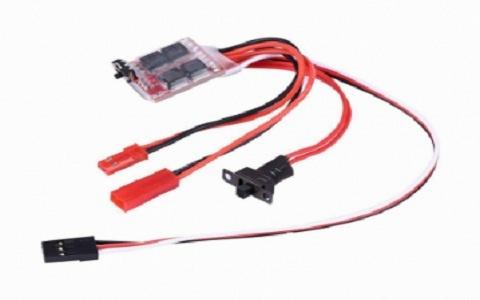
How has the global market for electronic speed controllers (ESCs) evolved in recent years?
It’s been a real rollercoaster journey in the global market for electronic speed controllers, hasn’t it? Within just the last few years, there’s been a remarkable evolution worth talking about. In line with the steady uptick in technological advancements, the demand for ESCs has surged significantly due to an increased interest in drones, electric cars, and RC vehicles.
Miniaturization is a major trend that’s been shaping this market. ESCs are packing more tech into smaller packages, mirroring the shrinking size of devices, whilst their capabilities continue to skyrocket. In fact, this trend towards smaller, more efficient speed controllers has stemmed from the need to streamline products without compromising their performance – a tricky trade-off but one that manufacturers are increasingly nailing down.
On the other hand, there’s a growing push for sustainability. It’s a wave that’s sweeping industries across the board, and ESCs are no exception. Manufacturers are making a conscious effort to reduce their carbon footprint by using more environmentally friendly components.
These shifts in the landscape of the ESC market have been driven by both innovation and a responsiveness to changing consumer needs. Companies are not just hearing, but actually listening to people’s requirements and responding in kind, with advancements that make ESCs more versatile and efficient.
So folks, in essence, the evolution of the global ESC market has been as electrifying as the devices they power!
Breaking the Communication Barrier
The mechanics behind the magic
Ever wondered exactly why electronic speed controllers (ESCs) are so crucial to the functionality of motor-driven devices? It’s all about communication. Just as we humans need a common language to understand each other, so do the controller and motor in a device. And that’s where the ESC comes in, as a pivotal translator and intermediary in this conversation.
So, how does it work? To keep things simple, imagine the ESC speaks both ‘Controller’ and ‘Motor’. When you adjust the controller (say, the throttle of your drone), it sends a specific signal to the ESC. In technical jargon, this signal is termed as ‘pulse width’, which simply refers to the duration for which the signal is high or low. Understanding this ‘Controller’ language, the ESC now translates this pulse width into equivalent ‘Motor’ language. Basically it adjusts the amount of power drawn from the battery and supplied to the motor, directly translating to change in motor speed. Intelligent, isn’t it?
This fascinating process brilliantly sums up why electronic speed controllers are essential in motor-based devices. Without an effective ESC, your highest-end motor would simply not know how to function, just as we would be lost in a foreign country without knowing the local language. Needless to say, this intricate dance of signals that the ESC manages, not only ensures your device runs smoothly, but also efficiently and safely. An important PSA: Always ensure your ESC is well-maintained and capably handles the communication between your controller and motor!
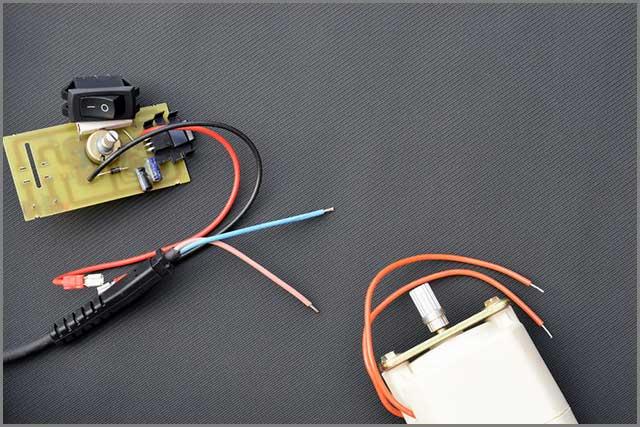
What is pulse width and how does it relate to electronic speed controllers (ESCs)?
Okay, imagine pulse width as the width of your breath. Imagine you’re blowing on a pinwheel: the longer you blow (the wider your pulse), the faster the pinwheel spins. Analogously, in the world of electronics, pulse width determines the speed of motors.
So, here’s where Electronic Speed Controllers (ESCs) come into play. Like a maestro conducting an orchestra or a DJ crafting the perfect mix, an ESC translates command signals from your main controller (that could be you, buddy) and modulates the pulse width to control motor speed. A bit like telling your pet pooch to sit, roll over, or fetch; you don’t need to know canine psychology, you just need a willing dog and a straightforward command. Likewise, with ESCs, you don’t need to sweat the complexities of motor dynamics, just pulse a command and watch the magic unfold.
At least that’s the story in my book. Be it a drone cruising the skies or a robotic arm snatching objects, behind their smooth operation is likely an ESC diligently tuning pulse width, pretty cool isn’t it? Don’t worry, it took me a while to wrap my head around this concept too. But once you understand it, it’s like seeing the Matrix – suddenly the world of electronics becomes a whole lot more fascinating!
Explaining the Types and Importance of ESCs
In the fascinating realm of Electronic Speed Controllers, you’ll come across two main types; Brushed ESCs and Brushless ESCs. Let’s picture these types like distinct keys designed to fit specific locks; in this case, the locks being the motors. Brushed ESCs are the old school mates, designed for brushed motors. Now, these brushed motors have their charm, offering simplicity and low cost, but they wear down over time. That’s where the Brushless ESCs come into play. They’re the match for brushless motors, which are the newer, more efficient kids on the block. These motors are more durable and provide cleaner operation, making them the darlings of the Drone and RC Model world. So, figuring out why electronic speed controller type matters is like understanding that you can’t open a lock with the wrong key. If you’re a drone enthusiast, you can delve into more details on ESC types on DroneNodes.com, a comprehensive site for drone hobbyists. Just remember, whether you’re building, upgrading, or repairing, using the right ESC will make a world of difference.
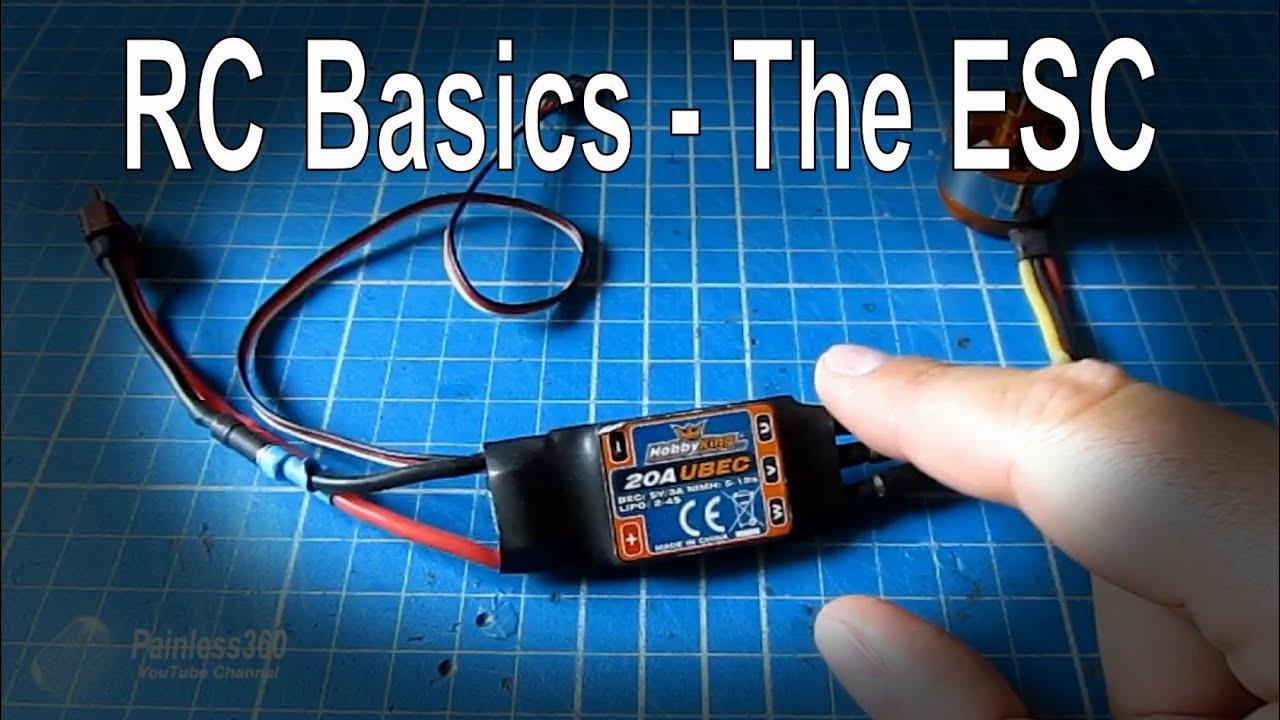
What are the advantages of using brushless motors with brushless ESCs in drone and RC models?
Of course! Brushless motors paired with brushless electronic speed controllers (or ESCs, as they’re lovingly called in the RC community) are a match made in heaven when it comes to drone and RC models. They’re like peanut butter and jelly, really! The main advantage? It all comes down to efficiency and durability.
Brushless motors boast a longer life span and less maintenance compared to their brushed counterparts. You know, like that old RC car you used to have to fix up every other weekend (we’ve all been there!). Plus, their power efficiency is top-notch, giving your drone or RC model more flight or run time. Nothing kicks enjoyment up a notch like being able to play around with your model for a longer period, am I right?
Now, adding a brushless ESC into the mix amplifies these benefits. These savvy devices are programmed to provide accurate, smooth and fast motor control, leading to an improved performance of your drone or RC model. It’s like making the perfect espresso shot with a high-end machine instead of an ordinary coffee maker.
Lastly, let’s not forget the quieter operation. Less noise, more peace – just you and the thrilling feeling of maneuvering your beloved drone.
So, to sum it up: longer lifespan, more power efficiency, boosted motor control, silent operation – these are the fantastic advantages of using brushless motors with brushless ESCs in your drone and RC models. It seems like a no-brainer, doesn’t it?
The Crucial Role of Electronic Speed Controllers in Your Electric Motor System
For why electronic speed controller is such an indispensable component, let’s think about it this way; the ESC you might say, is the heart of your electric motor system. Just like the heart regulates the flow of blood in our body, an ESC regulates the power to the motor. Here’s where it gets tricky though, imagine if our heart pumped too much or too little blood? It would result in catastrophic consequences. Similarly, an ESC that isn’t compatible with your motor could lead to devastating effects.
For instance, an ESC with a current rating that’s too low for the motor it’s paired with will overheat and at worst, could even start a fire. On the other hand, one with a current rating that is too high can significantly reduce efficiency. This means you’ll be losing power and as a result, performance.
A few handy guidelines to bear in mind while choosing an ESC include considering the type of the motor, its size, the total load it’s expected to carry and yes, the kind of battery you’re going to use. It’s a lot like cooking the perfect dish, you’ve got to get the ingredients just right. In the world of electric motors, the right ESC is that key ingredient!
Amidst the vast ocean of ESCs offered by various online platforms like www.hobbyking.com, www.banggood.com, and www.amazon.com you’ll find that each ESC flaunts unique features catering to specific requirements. Hence, understanding why electronic speed controller is crucial not just equips you with knowledge but empowers you to make an informed decision towards optimizing the performance of your electric system.

What should you consider when choosing an ESC for your electric motor system?
Choosing the perfect ESC, or Electronic Speed Controller, for your electric motor system? Put on some thinking caps, pals, because we’re about to dive right into it.
First off, you absolutely need to pay attention to the voltage and current ratings. Make sure they are not only compatible, but also have a bit of a buffer zone. It’s kind of like making sure you’ve got room to grow into that fancy new pair of shoes.
Next, think about the type of your motor – Brushless or Brushed? Don’t laugh, I’ve seen people mix them – not a pretty sight.
Some other attributes that might not be front and center in your mind? Braking and reversing – keep in mind, not all systems need them, but if you do, it’s highly convenient to have them built-in.
Lastly, consider the programming and tuning flexibility. Some ESCs come with their own software, which can be a lifesaver. Finding the balance between what’s easy and what gives you the most control isn’t always a walk in the park.
And hey, remember that visiting forums and asking in communities for opinions or suggestions can be super helpful. You’re not alone in this – there are loads of folks out there just as passionate and willing to lend a hand. After all, building the perfect system is a bit of a team sport, isn’t it?
Why Electronic Speed Controller: Industry Frontrunners
Leading ESC manufacturers play a crucial role in why the electronic speed controller is so essential to many of our favorite gadgets. Let’s take a look at a few industry frontrunners:
- First up is Yuneec, which is known for providing ESCs in their high-end drones. Yuneec’s ESCs are designed for improved stability, precision, and control, ensuring that your drone flight is as smooth as possible.
- ZTW is another noteworthy manufacturer, offering ESCs for radio-controlled cars, boats, and aircraft. ZTW prides themselves on their products’ reliability and durability, making them a trusted choice for many hobbyists and professionals alike.
- Dedicated to performance, KISS ESCs are favoured by many when it comes to competitive drone racing. Their ESCs focus on delivering rapid and responsive controls, giving racers the edge they require in those high-speed chases.
- Lastly, HobbyWing has made a name for themselves with ESCs that offer advanced programming features for a customizable experience. They cover a wide range of applications, from electric scooters to professional cinematographic drones. HobbyWing’s ESCs ensure the perfect balance of performance and efficiency.
These manufacturers are continually innovating, aiming to enhance the functionalities and efficiency of electronic speed controllers. As technology advances, these leading companies are certainly ones to watch. Remember, if you’re into RC hobbies or professional drone flying, choosing the right ESC can make a big difference in your overall experience.
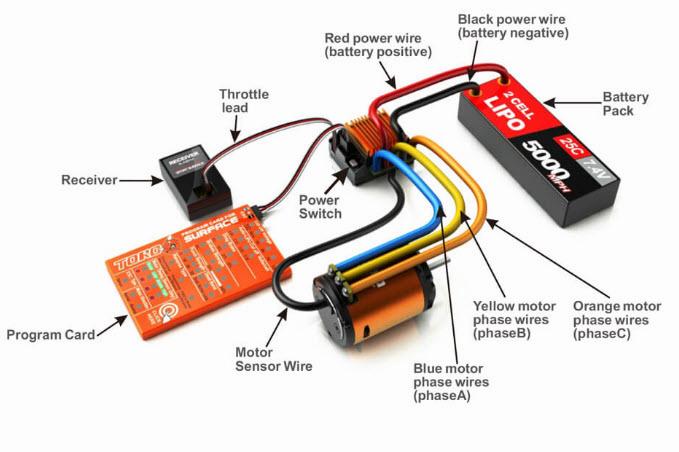
What are some features to consider when choosing an ESC for RC hobbies or professional drone flying?
Choosing the right ESC (Electronic Speed Controller) for your RC hobbies or professional drone flying isn’t just about picking any old component – it’s really about taking the time to select the right ‘heartbeat’ for your system.
After all, the ESC plays a critical role, it controls the speed of your RC’s motor and directs how your drone performs in the sky. Why not give it the thought it deserves? Now, there are quite a few things to consider when eyeballing an ESC.
Firstly, consider the ‘continuous current rating’. The ESC you choose should match the current requirements of your motor. Underrated ESCs could overheat or even damage your system. So, like selecting the perfect suit, a good fit matters here!
Next up, never underestimate the ‘voltage range’. This needs to match your battery. If your ESC can’t handle the volts your battery is packing, your drone could perform poorly, or worse, not at all. I mean, imagine showing up to a party without a gift, ouch!
Also important is the ‘BEC ratings’. The Battery Elimination Circuit distributes power to servos and the receiver, pretty essential. Like a party planner juggling all the guests’ needs, the BEC makes sure everything gets what it needs.
Finally, don’t forget the ‘compatibility’ with your motor. Does your ESC play nice with brushless motors, or does it prefer its old friend, the brushed motor? Compatibility is key in any relationship, and this one is no exception!
So there you have it – that’s my advice to you. Take the time, consider your ESC carefully and ensure it fits with your overall system. And remember – when it comes to drone flying, a thoughtful choice is always a soaring success.
In wrapping up, there’s no doubt about the significance of the electronic speed controller (ESC) in our tech-driven world today. These tiny yet mighty devices are the backbone of countless modern technologies like drones, RC cars, and boats, playing a silent but crucial role in their operation. Their ability to meticulously manage the speed, direction, and braking capability breathes life into these devices. But, as we’ve covered, choosing the right ESC could spell the difference between the smoothest ride and catastrophic failure. The key is understanding your specific needs and matching them with the right type of ESC. Looking ahead, the future of ESCs is promising, as evident from their projected market growth, we can’t wait to see how they’ll revolutionize new territories in technology. So, not only is it important to understand ‘why electronic speed controller’, but also ‘which’ and ‘how’ to let you take full control of your device. Here’s to a technologically empowered future, powered and controlled by the humble ESC.

